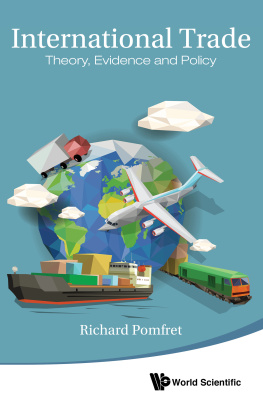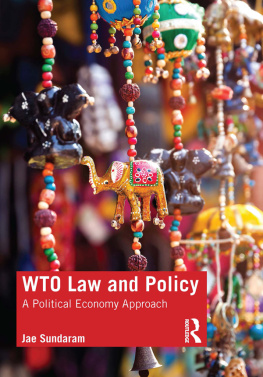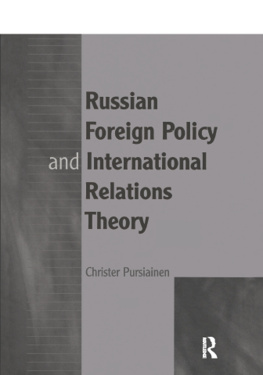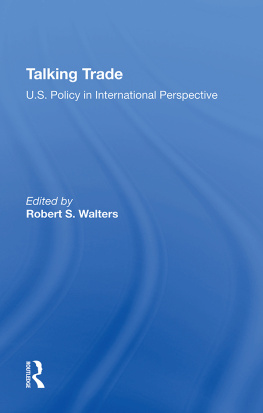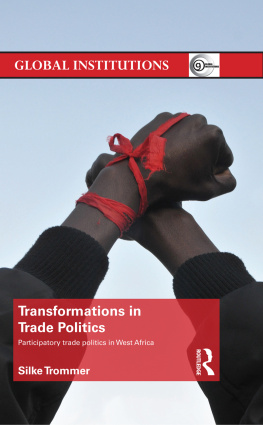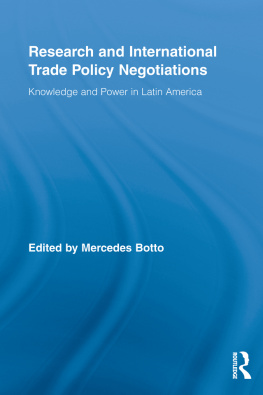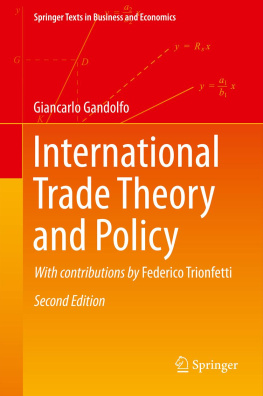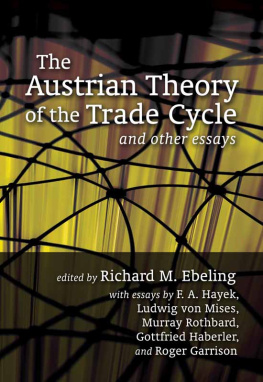International Trade
Theory, Evidence and Policy
Richard Pomfret
University of Adelaide, Australia & The Johns Hopkins University, Italy
Published by
World Scientific Publishing Co. Pte. Ltd.
5 Toh Tuck Link, Singapore 596224
USA office: 27 Warren Street, Suite 401-402, Hackensack, NJ 07601
UK office: 57 Shelton Street, Covent Garden, London WC2H 9HE
Library of Congress Cataloging-in-Publication Data
Names: Pomfret, Richard W. T., author.
Title: International trade: theory, evidence and policy / Richard Pomfret
(University of Adelaide, Australia & The Johns Hopkins University, Italy).
Description: New Jersey: World Scientific, [2015] | Includes bibliographical references.
Identifiers: LCCN 2015048382 | ISBN 9789814725071 (hc: alk. paper)
Subjects: LCSH: International trade. | Commercial policy.
Classification: LCC HF1379 .P662 2015 | DDC 382--dc23
LC record available at http://lccn.loc.gov/2015048382
British Library Cataloguing-in-Publication Data
A catalogue record for this book is available from the British Library.
Copyright 2016 by World Scientific Publishing Co. Pte. Ltd.
All rights reserved. This book, or parts thereof, may not be reproduced in any form or by any means, electronic or mechanical, including photocopying, recording or any information storage and retrieval system now known or to be invented, without written permission from the publisher.
For photocopying of material in this volume, please pay a copying fee through the Copyright Clearance Center, Inc., 222 Rosewood Drive, Danvers, MA 01923, USA. In this case permission to photocopy is not required from the publisher.
In-house Editors: Harini/Philly Lim
Typeset by Stallion Press
Email:
Printed in Singapore
Preface
This book provides an integrated non-mathematical account of trade theory and policy that can be read straight through. The footnotes provide caveats, extensions and entry points or further reading, and can be ignored without loss of continuity or essential content. It is intended primarily for students with some background in economics at a minimum an Economics Principles course, preferably an intermediate course in Microeconomics but should also be accessible to other readers.
The core theoretical analysis of international trade in , which hints at the inter-relationships among them.
A common feature of the new topics is that they have been driven by empirical research. The significance of global value chains was first highlighted by anecdotal evidence and then by in-depth case studies. Research on firm behaviour and on trade costs was fostered by researchers having the desktop computing capacity to analyse large datasets of individual firms characteristics and of trade flows disaggregated to very finely detailed levels. Although this research is to a large extent empirical rather than theory, it is related to because it seeks to explain international trade rather than directly addressing policy issues. However, it has impacted on policy, especially through increased focus on trade facilitation.
The trade policy environment has shifted since the turn of the century. Earlier analysis of tariffs and non-tariff barriers remains valid, and has underpinned a substantial reduction in tariffs and removal of the most egregious non-tariff barriers in the major trading nations and emerging economies. WTO membership continues to increase, as almost all of the worlds governments recognise the value of an agreed world trade law and of the WTO as arbiter, albeit that the dispute settlement mechanism remains limited. In the twenty-first century, however, it is increasingly recognised that negotiation of large trade bargains as in the GATT rounds of multilateral trade negotiations is of limited usefulness in a world of low tariffs. The proliferation of plurilateral, regional and bilateral trade agreements, which largely centre on areas such as trade facilitation that are poorly covered by the WTO, is a response to the changing policy environment.
The analysis of trade policies in

